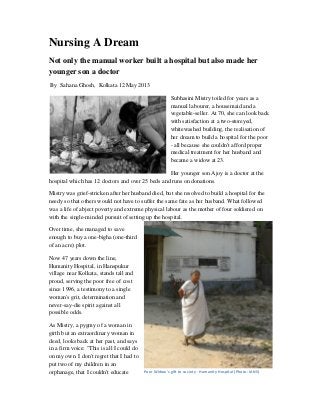
Nursing a dream
- 1. Nursing A Dream Not only the manual worker built a hospital but also made her younger son a doctor By Sahana Ghosh, Kolkata 12 May 2013 Subhasini Mistry toiled for years as a manual labourer, a housemaid and a vegetable-seller. At 70, she can look back with satisfaction at a two-storeyed, whitewashed building, the realisation of her dream to build a hospital for the poor - all because she couldn't afford proper medical treatment for her husband and became a widow at 23. Her younger son Ajoy is a doctor at the hospital which has 12 doctors and over 25 beds and runs on donations. Mistry was grief-stricken after her husband died, but she resolved to build a hospital for the needy so that others would not have to suffer the same fate as her husband. What followed was a life of abject poverty and extreme physical labour as the mother of four soldiered on with the single-minded pursuit of setting up the hospital. Over time, she managed to save enough to buy a one-bigha (one-third of an acre) plot. Now 47 years down the line, Humanity Hospital, in Hanspukur village near Kolkata, stands tall and proud, serving the poor free of cost since 1996, a testimony to a single woman's grit, determination and never-say-die spirit against all possible odds. As Mistry, a pygmy of a woman in girth but an extraordinary woman in deed, looks back at her past, and says in a firm voice: "This is all I could do on my own. I don't regret that I had to put two of my children in an orphanage, that I couldn't educate Poor Widow's gift to society - Humanity Hospital (Photo: IANS)
- 2. them. There were things needed to be done for the greater good." Mistry said: "When my husband passed away, I was in shock initially. Then I realised I had four hungry mouths to feed. My oldest child, a son, was four-and-a-half-years old at the time. My youngest, a daughter, was one-and-a-half. "I had no education and couldn't even tell the time. So I decided I would do whatever work that was available. I started out as an aayah (domestic help) in the nearby houses." During that period, she made a silent promise to herself: she would set up a hospital for the needy that would provide treatment free of cost. Gradually she realised that house work alone would not suffice; so she took to brick-laying and other physically demanding chores to supplement her meagre income. Her two sons would lend a hand at work. Early on, she had made up her mind that come what may, she would educate one of her sons to be a doctor. Now the younger son Ajoy, a doctor, carries on her mother's mission at the hospital. "I did everything. My children used to earn Re.1 while I used to get Rs.1.25. I never spent on myself. Whatever I earned, I saved most of it for the hospital. "Some of my earnings were spent on educating my younger son and daughter. Unfortunately the other two I had to send to an orphanage," Mistry said. She put aside the majority of what she earned and after around 30 years of scrimping and saving, she had collected enough to buy a plot of land. "One of the babus (landlords) was selling off his land. I went to him and fell at his feet to let me buy the plot for a lesser amount. He relented and finally a part of my dream came true," said Mistry. In 1993, the Humanity Trust was formed and a temporary clinic was set up with the combined effort of all the residents. "I went about asking them to contribute in any way they could. Some donated money, some wood, some gave the material needed for construction while some volunteered for construction work," said Mistry. Bit by bit, a one-room clinic came into being. And at Mistry's behest three doctors from nearby areas started treating the sick free of cost.
- 3. In 1996, a permanent building was inaugurated by then West Bengal governor K.V.Raghunath Reddy. Since then Mistry and her small staff, which includes one of her daughters, has never looked back. In 2009, she won the prestigious Godfrey Phillips Bravery Award in the mind-of-steel category. According to Mistry, a lot of things remain to be done which have hit a pause due to a financial crunch. "Our main problem is shortage of doctors. They are only available on specific dates. Since we do not pay them, they are less inclined to visit regularly. "Due to lack of funds, the ICU is yet to be completed. I wish I could somehow get the finance to see these things through," said Mistry, who presides over urgent matters every day. Despite the tough road ahead, Mistry refuses to be bogged down. "My wish will be fulfilled entirely when doctors and nurses are available round the clock and when we can provide all the services of a modern hospital," she said. – IANS.
